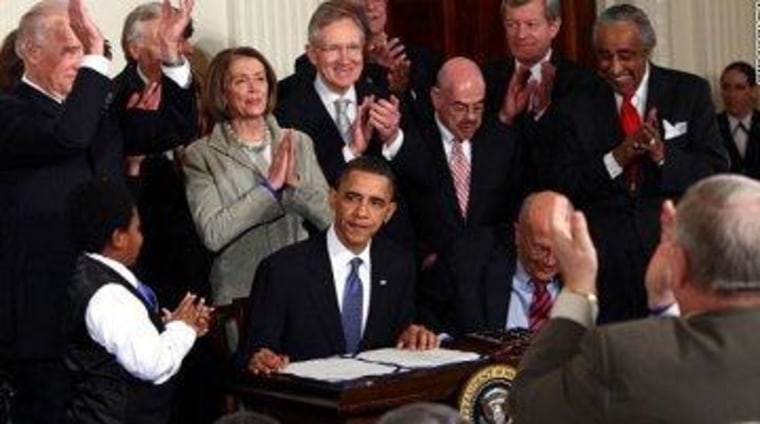One does not usually expect blistering, progressive-minded editorials from USA Today, but this morning's piece on the Affordable Care Act is a gem. The headline reads, "GOP poisons ObamaCare, then claims it's sick."
Regular readers know we've been talking quite a bit about Republican efforts to sabotage the federal health care system in the hopes of partisan and ideological gain, and it's good to see the USA Today editorial board notice. "Having lost in Congress and in court, they're now using the most cynical of tactics: trying to make the law fail," the paper explains. "Never mind the public inconvenience and human misery that will result.... There is a distinct line between fighting to turn your ideas into law and trying to wreck a law once it has been passed."
First, Republicans limited the use of government money to spread the word. Then, when the administration reached out to the NFL and other major sports leagues for help in publicizing the new health care exchanges, the opponents resorted to intimidation.Sens. Mitch McConnell, R-Ky., and John Cornyn, R-Texas, fired off a letter to the NFL, saying that the league had better not get involved with such a controversial program, as if the league would be taking sides on a debate in Congress, not doing public service announcements for a law soon to affect millions.In a particularly smarmy warning, McConnell and Cornyn told the NFL to let them know whether the Obama administration retaliated against the league for not cooperating -- the clear implication being that if the league did help inform the public about ObamaCare, Senate Republicans had their own methods of retribution. It is an appalling abuse of power, and the NFL meekly yielded.
It's against this backdrop that Sen. Pat Roberts (R-Kan.) falsely argued in his party's weekly radio address that the law would disrupt people's cancer care, and GOP governors nationwide block Medicaid expansion for no substantive reason.
It doesn't have to be this way, but it appears today's Republican Party knows no other way.
Of course, this isn't the only thing going on with Obamacare this week.
This story, for example, struck me as almost amusing.
House Budget Committee Chairman Paul Ryan (R-Wis.) is requesting a new cost estimate for ObamaCare in light of a decision to delay the law's employer mandate.Ryan's staff asked the Congressional Budget Office (CBO) to reevaluate the law's budget impact after the White House said Tuesday that larger employers will not be required to offer health insurance until 2015.
It's true that the delay on the employer mandate will likely shrink the deficit reduction of the law by about $4 billion in that first year. In other words, instead of nearly $200 billion in deficit reduction over the first decade of the Affordable Care Act, we're looking at a figure closer to $196 billion in deficit reduction.
But here's my follow-up question for Paul Ryan: why do you care? What difference does it make to House Republicans if it's $200 billion or $196 billion? Does the GOP really intend to run ads saying, "Obamacare is one of the biggest deficit-reduction packages in a generation, but it's savings are slightly smaller than the CBO estimated last year"?
As for the increasingly common argument among conservatives that the delay in the employer mandate spells implementation trouble for the reform law, Ezra Klein had a good piece explaining that the opposite is true.
Peter Orszag, who helped design Obamacare from his perch as head of the Office of Management and Budget, disagreed with Rubin. "Delaying the employer mandate makes successful implementation more likely, not less likely," he told me.Larry Levitt, vice president of the nonpartisan Kaiser Family Foundation, agreed. "There's nothing about the delay in the employer requirement that suggests Obamacare can't still be implemented," he said. "If anything the delay removes some potential administrative complexities from the plates of the implementers, and avoids the problem of some employers reducing the hours of part-time workers to get around the requirement."Timothy Jost, a health law expert at Washington and Lee University's School of Law, was even blunter. "Implementation just got easier rather than harder," he said.... The Obama administration has decided to accept some bad media coverage now, and some higher costs later, in order to make Obamacare much, much simpler to implement next year.
It seems like a relevant detail that's been lost amid the chatter of late.
